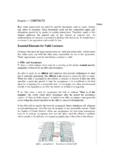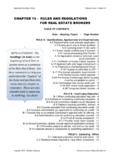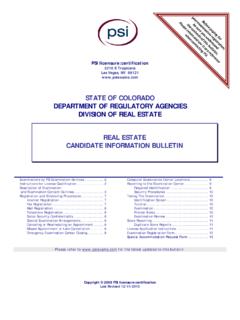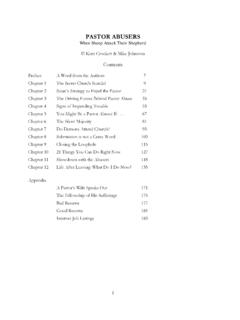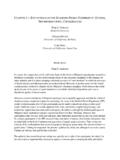Transcription of CHAPTER 18 - SUBDIVISION LAWS - MacIntosh R/E …
1 MacIntosh Real Estate School Colorado Course - CHAPTER 18. CHAPTER 18 - SUBDIVISION laws . Notes: 12-61-401. Definitions As used in this part 4, unless the context otherwise requires: (1) "Commission" means the real estate commission established under section 12-61-105. (2) "Developer" means any person, as defined in section2-4-401 (8), which participates as owner, promoter, or sales agent in the promotion, sale, or lease of a SUBDIVISION or any part thereof. (3) (a) " SUBDIVISION " means any real property divided into twenty or more interests intended solely for residential use and offered for sale, lease, or transfer.
2 (b) (I) The term " SUBDIVISION " also includes: (A) The conversion of an existing structure into a common interest community of twenty or more residential units, as defined in Article of Title 38, ;. (B) A group of twenty or more time shares intended for residential use; and (C) A group of twenty or more proprietary leases in a cooperative housing corporation, as defined in article of title 38, (II) The term " SUBDIVISION " does not include: (A) The selling of memberships in campgrounds;. (B) Bulk sales and transfers between developers;. (C) Property upon which there has been or upon which there will be erected residential buildings that have not been previously occupied and where the consideration paid for such property includes the cost of such buildings.
3 (D) Lots which, at the time of closing of a sale or occupancy under a lease, are situated on a street or road and street or road system improved to standards at least equal to streets and roads maintained by the county, city, or town in which the lots are located; have a feasible plan to provide potable water and sewage disposal; and have telephone and electricity facilities and systems adequate to serve the lots, which facilities and systems are installed and in place on the lots or in a street, road, or easement adjacent to the lots and which facilities and systems comply with applicable state, county, municipal, or other local laws , rules, and regulations; or any SUBDIVISION that has been or is required to be approved after September 1, 1972 by a regional, county, or municipal planning authority pursuant to Article 28 of Title 30 or Article 23 of Title 31.
4 (E) Sales by public officials in the official conduct of their duties. (4) "Time Share" means a time share estate, as defined in section 38-33-110(5), , or a time share use, but the term does not include group reservations made for convention purposes as a single transaction with a hotel, motel, or condominium owner or association. For the purpose of this subsection (4),"time share use" means a contractual or membership right of occupancy (which cannot be terminated at the will of the owner)for life or for a term of years, to the recurrent, exclusive use or occupancy of a lot, parcel, unit, or specific or nonspecific segment of real property, annually or on some other periodic basis, Copyright 2018 - All Rights Reserved 1 Colorado Contracts & Regs (48 credit hrs).
5 MacIntosh Real Estate School Colorado Course - CHAPTER 18. for a period of time that has been or will be allotted from the use or occupancy periods into which the property has been divided. 12-61-402. Registration required. (1) Unless exempt under the provisions of section 12-61-401(3), a developer, before selling, leasing, or transferring or agreeing or negotiating to sell, lease, or transfer, directly or indirectly, any SUBDIVISION or any part thereof, shall register pursuant to this part 4. (2) Upon approval by the commission, a developer who has applied for registration pursuant to section 12-61-403 may offer reservations in a SUBDIVISION during the pendency of such application and until such application is granted or denied if the fees for such reservations are held in trust by an independent third party and are fully refundable.
6 LICENSEE'S RESPONSIBILITIES. A real estate licensee cannot be expected to be completely familiar with all county and municipal planning laws , regulations, ordinances and zoning requirements. However, the licensee in negotiations should be very much aware of the existence of these laws , ordinances, zoning requirements, etc. It is only too easy to misrepresent property through ignorance. If uninformed, the licensee should seek the information from the proper source before making a representation, or the licensee should refer prospective clients to the proper source of the information.
7 Some facts should be known to the licensee through reading or logic, such as: (1) That the sale of a portion of a seller's land divides the land into two parcels and that a SUBDIVISION is created which must be approved by the proper authorities. (2) That if a structure is suitable for conversion into a duplex and/or a four-plex does not in itself mean that such a conversion does not violate the law. (3) That if you know the area is zoned for keeping horses, it does not necessarily follow that the acreage of the property is great enough. (4) That even if an area is zoned for a home business, there may be a prohibition against having employees.
8 Other complexities may also arise through various branches of local government involving utilities existent and future utilities. Representations concerning future services, zoning variances, etc. may endanger both the public and the licensee. The conversion of an existing building into a common interest community complex or the division of a single condominium unit into "time-shares" or "interval estates" also may be a SUBDIVISION under county planning laws and most certainly are a SUBDIVISION as defined in 12-61-401(3) and subject to the registration requirements of Title 12, Article 61, Part 4 A stock cooperative or cooperative housing corporation is defined in this CHAPTER and in Colorado are considered subdivisions of real estate.
9 The sale of these Copyright 2018 - All Rights Reserved 2 Colorado Contracts & Regs (48 credit hrs). MacIntosh Real Estate School Colorado Course - CHAPTER 18. "apartments" is accomplished by way of a transfer of a stock certificate, together with a proprietary lease. In most states, the sale of the stock, together with the lease, would be considered the sale of a security and would fall under the jurisdiction of the Division of Securities. In Colorado, such sales are exempted from the Securities Act and the sales of such interests are declared to be real estate. This was accomplished by Title 38, Article , printed in this CHAPTER .
10 Therefore, such cooperatives must be registered as subdivisions and the sale of the stock and proprietary leases must be performed by licensed brokers and salespersons. The Act also provides that commercial banks and savings and loan associations may make a first mortgage loan on the stock and proprietary lease of each "apartment owner". CONDOMINIUM OWNERSHIP ACT - TITLE 38, ARTICLE 33, Also see Colorado Common Interest Ownership Act which superseded this Condominium Ownership Act Effective July 1, 1992. Note: The portions printed below are only the those portions of the old condominium act that pertain to timeshare and conversion projects and that are still in place.

